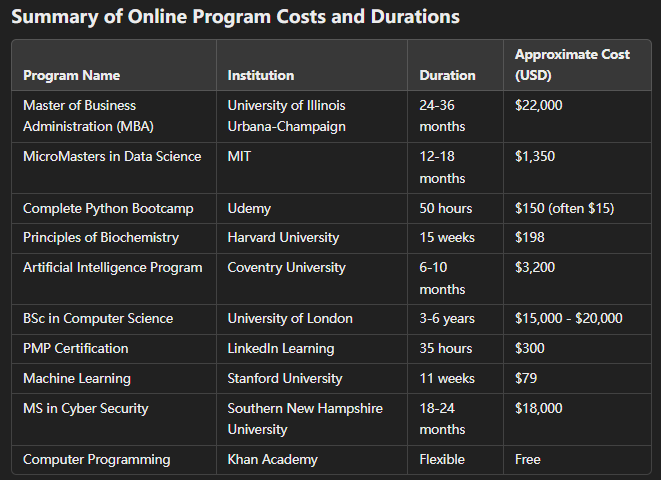The Evolution of Digital Education
The world of education has undergone a significant transformation in recent years, with fully online programs becoming a mainstream option for students across the globe. What once might have been considered an unconventional way of learning is now widely recognized and respected. This article explores the dynamics of graduating from a fully online program, highlighting its advantages, challenges, and the evolving perception of online degrees in the job market.

The Rise of Fully Online Programs
What Are Fully Online Programs?
Fully online programs refer to educational courses or degree programs that are delivered entirely over the internet. Unlike traditional classroom-based learning, these programs do not require students to attend in-person classes or be physically present on campus. Instead, learning takes place through digital platforms, offering flexibility in terms of study schedules and locations.
Institutions ranging from community colleges to prestigious universities now offer a wide variety of online programs, including certificates, bachelor's, master's, and even doctoral degrees. Advances in technology and the increasing demand for flexible learning options have fueled the growth of these programs.

Why Choose an Online Program?
The decision to enroll in a fully online program often stems from the desire for flexibility, affordability, and access to a broader range of courses. Some of the key reasons why students opt for online education include:
Flexibility and Convenience: Online programs allow students to learn at their own pace and schedule their studies around other commitments, such as work or family. This flexibility is particularly beneficial for working professionals or those with busy lives.
Accessibility: Online education breaks geographical barriers, enabling students to access programs from top universities around the world without having to relocate. This opens up opportunities for those living in remote or underserved areas to receive quality education.
Cost-Effective Learning: Many online programs are more affordable than their traditional counterparts. Savings can also come from reduced transportation costs, accommodation fees, and other expenses associated with attending a physical campus.
Wide Range of Course Options: From specialized fields like data science, digital marketing, and cybersecurity to traditional disciplines such as business, psychology, and healthcare, online programs offer a diverse array of courses that cater to a wide range of interests and career goals.
Benefits of Graduating from a Fully Online Program
Graduating from a fully online program has numerous advantages that make it a viable and attractive option for many students. Some of the notable benefits include:
1. Development of Self-Discipline and Time Management Skills
Online education requires a high degree of self-motivation, organization, and discipline. Students who successfully complete online programs often develop strong time management skills, which are valuable in both personal and professional life. The ability to balance studies with other commitments reflects well on their capability to handle multiple responsibilities.
2. Digital Proficiency and Technical Skills
In today’s technology-driven world, being digitally literate is essential. Online students become proficient in using various digital tools and platforms, from learning management systems to virtual collaboration software. This technological proficiency can be a significant asset in modern workplaces, where remote work and digital communication are becoming the norm.
3. Global Networking Opportunities
Fully online programs attract a diverse group of students from around the world. This global community allows for rich networking opportunities, fostering connections with peers from different backgrounds, cultures, and professional experiences. Such networking can lead to collaborations, career opportunities, and a broader perspective on global trends and practices.
4. Customizable Learning Experience
Online programs offer more personalized learning experiences. Students can often choose their study pace, focus on areas of interest, and even select specialized courses that align with their career aspirations. This customization helps learners to tailor their education to meet their specific goals.

Challenges of Online Education
While the advantages are numerous, there are also challenges associated with online learning that students must consider:
1. Lack of Face-to-Face Interaction
One of the main drawbacks of fully online programs is the limited face-to-face interaction with instructors and classmates. The absence of a traditional classroom setting can sometimes lead to feelings of isolation and reduced motivation. However, many programs have addressed this issue by incorporating live video sessions, discussion forums, and group projects to foster interaction.
2. Self-Motivation is Key
The flexibility of online programs can also be a double-edged sword. Without the structure of a physical classroom, it can be easy to procrastinate or fall behind on coursework. Successful online students need to be highly motivated and disciplined to stay on track and meet deadlines.
3. Perception of Online Degrees
Although the acceptance of online degrees has improved significantly, some employers may still have reservations about the credibility of certain online institutions. It’s important for students to choose accredited programs from reputable institutions to ensure that their degree is recognized and valued in the job market.
Recognition of Online Degrees in the Job Market
The perception of online degrees has evolved remarkably over the past decade. Employers are increasingly recognizing the value of skills and knowledge acquired through online education, especially from accredited and well-regarded institutions. Graduates from online programs are often seen as self-starters who can manage their time effectively and adapt to new technologies.
The Impact of COVID-19 on Online Education Acceptance
The COVID-19 pandemic played a significant role in accelerating the acceptance of online education. As many traditional universities shifted to virtual learning during the pandemic, the line between online and in-person education became increasingly blurred. This shift helped normalize online learning and highlighted its effectiveness as a legitimate alternative to traditional education.
Choosing the Right Program
When considering an online program, it is crucial to select one from an accredited institution with a strong reputation in the field of study. Accreditation ensures that the program meets high educational standards and that the degree will be recognized by employers and other academic institutions. Additionally, students should research the program's alumni success stories and industry connections to assess its overall value.

Conclusion
Graduating from a fully online program is no longer just a convenient alternative to traditional education—it is a respected and valuable path to achieving academic and career goals. As technology continues to shape the future of education, online learning is becoming a preferred choice for many seeking flexibility, affordability, and access to high-quality programs from anywhere in the world.
While challenges such as the need for self-motivation and the varying perceptions of online degrees remain, the benefits of digital literacy, global networking, and the ability to manage time effectively outweigh these drawbacks. With the increasing recognition of online degrees by employers and the rise of accredited programs, fully online education is here to stay, providing limitless opportunities for learners in the digital age.

